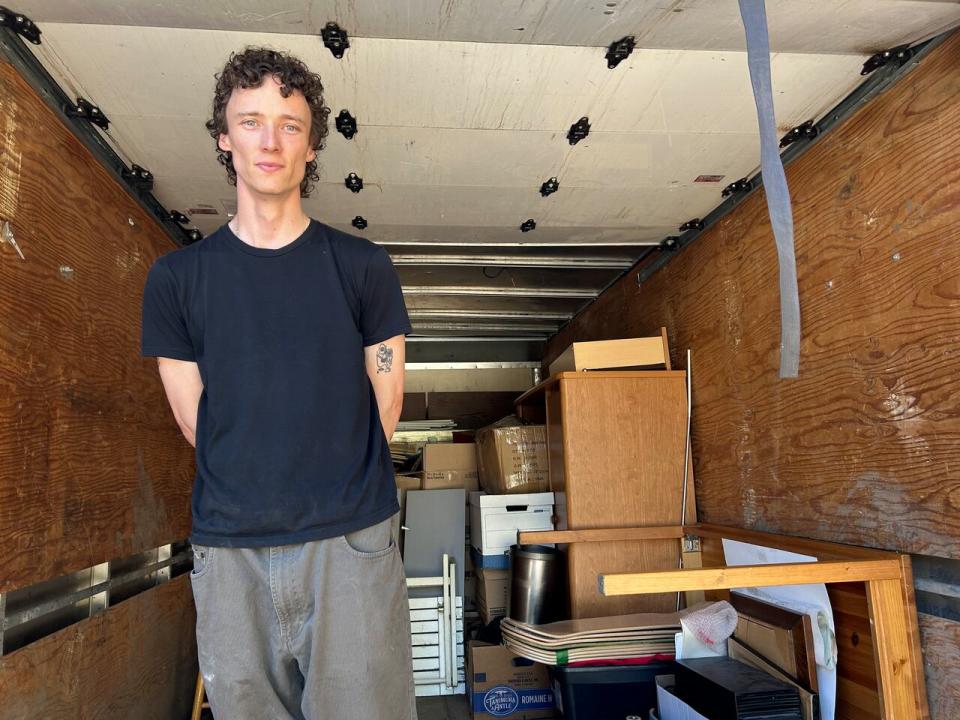This year's moving day marked by high eviction numbers
Quebecers are used to moving on July 1 — when most leases end — but moving companies are seeing that change due to a high number of evictions and unit repossessions.
Pierre-Olivier Cyr, co-owner of one of Quebec's largest moving companies, Le Clan Panneton, says his business was only booked at half capacity Monday because most people have been moving in the few days before or after instead.
He says it's because landlords who evict their tenants have to pay for their moving expenses and want to avoid the higher fees on July 1. About 40 per cent of his clients this year were evicted, much more than last year, he said.
Cyr also says his company's storage facilities are filled beyond capacity while people wait to find a place to live as hundreds have been left without a lease.
"We received a lot of phone calls from people who want to move and reserved the date, but they don't know where they're going … People are not finding a place to live or storage so it's a really difficult psychological situation to manage for the tenants," he said.
"The authorities will have to do something because in a few years it will be catastrophic."

Frederick Walsh, a graphic design student at Université du Québec à Montréal (UQAM), is one of the lucky Montrealers who had no problem finding a new place to live. He's leaving Ville-Marie to take over a room in his friend's apartment in Rosemont, farther away from campus. But he says he'd live alone if he could and is concerned about rising rents.
"I'm not willing to pay $800 for a room," he said.
"It sucks because the rents are getting higher and the people are not getting paid as much. I don't think that's fair and it worries me."
For hundreds of other Montrealers, it's been a headache to find a flat. The Office municipal d'habitation de Montréal (OMHM) said it received 811 requests for help finding housing since Jan. 1. It helped 244 tenants in their search and temporarily lodged 38 households while they wait for stable housing.

"Moving is a stressful time for many Montrealers, who are increasingly finding it difficult to find housing options that meet their needs and budget," said a spokesperson for the city of Montreal in a statement.
"We're ready to support anyone in need today and in the days ahead. If you need help, we invite you to call 311. We're here for you."
Meanwhile, the Société d'habitation du Québec (SHQ) is temporarily housing 125 households in hotels — 63 of which are in Montreal — and noted that another 259 households are temporarily living with loved ones in the province.
The SHQ says it's already processed over 9,000 housing assistance requests since Jan. and that 2,251 — from households with leases — are still active.
Catherine Lussier, a coordinator with the housing group Front d'action populaire en réaménagement urbain (FRAPRU), said Montreal's housing situation is hard, particularly for low-income tenants who cannot afford what is on the market right now.
The official numbers are the "tip of the iceberg" because a lot of people will move back in with their parents or seek help elsewhere before reaching out for housing support services, she said.
"It's hard when there's not a lot of availability and not a lot of affordability," said Lussier.
Lussier pointed to the sharp increases in rent prices and a lack of subsidized housing. The Canada Mortgage and Housing Corporation (CMHC) estimates that the average rent increase for a two-bedroom apartment in Montreal was 18.9 per cent for apartments with a new tenant, compared to 5.7 per cent for apartments with the same tenant as the previous year.


